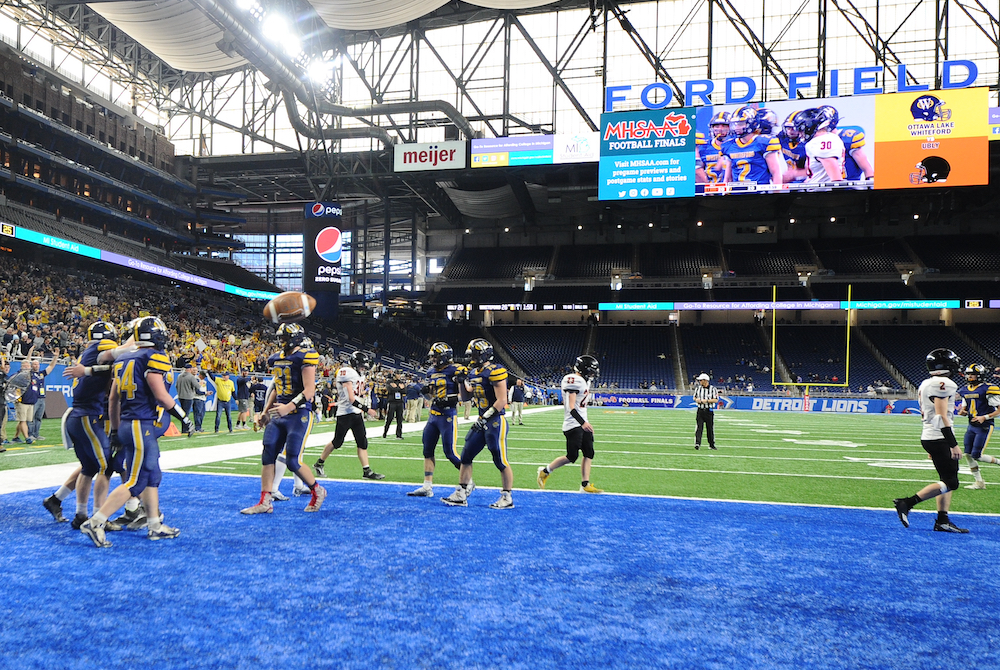
Best Practices
June 28, 2016
Two-thirds of concussions reported in Michigan high school football last fall occurred in games. Even though there are at least five times more hours of exposure during practices than games, there are half as many concussions during practice, according to the mandated concussion reporting requirement of the Michigan High School Athletic Association that is unmatched in the country in terms of its depth and breadth for a statewide requirement.
Michigan was among the handful of states to restrict contact in practice, in 2014, a full season prior to recommendations from the National Federation of State High School Associations and later action by most other statewide associations.
Some of those statewide organizations continue to operate without limitation on contact in football practices, while their counterpart organizations in other states have gone so far as to limit contact to a certain number of minutes in a day and/or week.
Entering mostly uncharted waters for high school football in early 2014, an MHSAA task force recommended that the number of practices be limited where collisions between players could occur – no more than one per day during preseason, no more than two per week after the first game.
This change was embraced by this state’s football coaches association and adopted by the MHSAA Representative Council. All parties liked the ease of administration of this policy, and all distrusted the idea of limiting the number of minutes of contact during practices.
If there is a 30-minute limit on contact in a day or a 90-minute limit on contact in a week, is it the same 30-minute or 90-minute period for all players, even if many are not involved in one or more of the contact drills? Or does the limit apply to each player individually; and if so, how is that tracked, and by whom?
These and other questions made coaches and administrators question how effective a limit on minutes might really be. Nevertheless, a 90-minute per week limit during regular season has been made an MHSAA recommendation for the 2016 season. This will provide an opportunity to address and possibly answer some of the questions that have been raised.
The MHSAA will survey schools this fall about their practice plans and the actual time spent in contact drills by players, assessing how that differs according to offense, defense, player position and grade in school, and determining best practices for how to track player contact minutes.
When Michigan acted in 2014 to limit contact in practice, it was one of the first states to do so. As Michigan takes additional steps to limit contact in practice, it will be one of the first states to do so after researching the best ways to actually do it.

Set, Ready, Challenge: 11-Player Football Finals Challenges New in 2022
By
Jon Ross
MHSAA Director of Broadcast Properties
November 25, 2022
New this year at the MHSAA 11-Player Football Finals is the opportunity for head coaches to challenge a call.
In previous years, all potential scoring plays and potential turnovers were automatically reviewed. That process will continue and now, under a limited set of circumstances, the head coach can challenge calls.
To do so, the head coach must first call a timeout. If a team has no timeouts remaining, they are not able to challenge a call. Challenges must be presented to the officials immediately after the timeout is granted. If the challenge is successful, the team will get its timeout back and have the ability to challenge one more call during regulation. A second successful challenge will not result in the ability to challenge a third call.
The following plays are reviewable by challenge:
- Complete/incomplete passes
- Runner/receiver in/out of bounds
- Runner ruled not down
- Forward progress spot as it relates to the yard to gain
- First touching of a kick
- Recovery of a ball in/out of bounds
- Forward/backward pass
- Penalties called on the field only for:
- Illegal forward pass
- Targeting or illegal helmet contact
- Pass interference only as it relates to the pass being previously tipped
NOTE: All other penalties called on the field are not reviewable. These include, but are not limited to: illegal formation, ineligible receivers downfield, illegal participation, illegal substitution or delay of game. If a penalty is not called by the officials on the field, the play can never be reviewed to retroactively call a penalty.
In overtime, challenges – like timeouts – reset. Each team has the ability to challenge one call for the entirety of overtime, but must have a timeout to use to do so. A successful challenge in overtime will not result in the ability to challenge a second call.
If a play is overturned in regulation or overtime, the replay officials will correct all aspects of the play including time, position of the ball and whether the clock will be started on the RFP or snap. The game clock or play clock may be reviewed only as it directly relates to the overturning of a call on the field.
There is no change to the review of potential scoring and potential turnover plays. Those plays are automatically looked at by the replay official and replay assistant. If the replay official can confirm the ruling on the field without stopping play, the official will do so. If more time is needed to review the play, the on-field referee will announce that and then will announce the replay official’s decision. For a play to be reversed, there must be indisputable video evidence that shows the original call was incorrect. Every attempt will be made to complete the review process in 90 seconds or less.
The addition of the coach’s challenge was approved by the MHSAA’s Representative Council at its May 2022 meeting.

